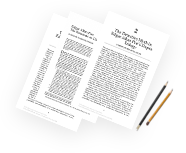nursing Leadership Reflection Following Clinical
Regardless whether or not you are a born leader or you became a leader later in life, you will face situations in which you will learn, practice, and develop. Leadership is a journey.
Who do you want to be as a leader? Authentic leaders have a habit of continuous self-reflection. Self-awareness is a core value for a responsive leader.
Every week following clinical and due before your next clinical day, you will write a reflective journal about your clinical experience. You will answer the following questions:
1. What new learning occurred in this clinical?
2. Did anything concern you about this clinical experience?
3. How will this clinical enhance your ability to become a leader?
4. Answer weekly topic question (see below).
Expert Solution Preview
Introduction:
Reflective journaling is a valuable tool for healthcare professionals to enhance their self-awareness and leadership skills. In this assignment, students are required to write a reflective journal following their clinical experience and address specific questions. This exercise aims to encourage continuous self-reflection and allows students to identify their learning, concerns, and how their clinical experience contributes to their development as leaders.
Answer:
1. In this clinical, I experienced new learning in the field of nursing leadership. Through observation and participation, I gained insights into effective communication and collaboration among healthcare team members. I learned the importance of clear and concise communication in providing safe and quality care to patients. Additionally, I witnessed the significance of teamwork in achieving positive patient outcomes and enhancing the overall healthcare experience.
2. During this clinical experience, a specific concern that arose was the issue of time management. As a leader, it is crucial to prioritize tasks, delegate responsibilities, and ensure efficient utilization of resources. However, I noticed instances where time management was not effectively practiced, leading to delays in patient care and potential adverse outcomes. This concern highlighted the importance of developing strong organizational and time management skills to become an effective leader in the healthcare setting.
3. This clinical experience will enhance my ability to become a leader by providing me with a firsthand understanding of the challenges and responsibilities involved in healthcare leadership. By observing and interacting with leaders in the clinical setting, I gained knowledge about the qualities and skills necessary for effective leadership. This experience will serve as a foundation for me to develop my own leadership style and strategies that align with the values and needs of both patients and healthcare professionals.
4. Weekly topic question: How can effective leadership contribute to improving patient outcomes and the overall quality of healthcare delivery?
Effective leadership plays a critical role in improving patient outcomes and the overall quality of healthcare delivery. A competent and visionary leader establishes a positive work environment and promotes teamwork and collaboration. This fosters effective communication, encourages shared decision-making, and enhances the coordination of care.
By prioritizing patient safety and quality improvement, effective leaders create a culture of continuous learning and accountability among healthcare providers. They establish clear goals, implement evidence-based practices, and monitor outcomes to drive performance improvement. Effective leadership also ensures the allocation of resources, including staffing and supplies, to support optimal patient care.
Moreover, leaders who prioritize patient-centered care and actively engage patients and their families in decision-making contribute to improved outcomes. Through effective communication and empathy, leaders can address patients’ concerns, promote adherence to treatment plans, and foster a positive patient experience.
In summary, effective leadership in healthcare is essential for improving patient outcomes and the overall quality of care. By creating a supportive work environment, fostering collaboration, implementing evidence-based practices, and prioritizing patient-centered care, leaders can drive positive change and contribute to the advancement of healthcare delivery.




